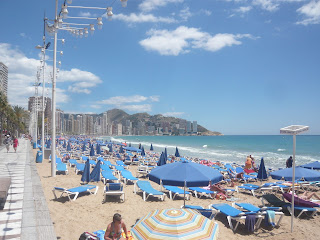Imagine a bed surrounded by the debris of a week’s illness, soiled sheets and slashed pillows, pills and vodka bottles, used condoms and tissues. This is ‘My Bed’ an installation by Tracy Emin was first exhibited in 1999. You’ll probably remember reading about it in the press at the time as it prompted the usual “call that art, my two-year old could have done better” kind of articles. A bed is a powerful symbol of birth and death, sex and intimacy but this controversial installation was perhaps an image of our culture’s sickness and dis-ease surrounded by the remnants of those things through which we seek a cure; sex, alcohol, drugs, tears, aggression. And the bed, like many lives, was empty. The morning after the cure that never came.
Sometimes our lives feel like that installation. Our relationships may have broken down, we may have been abused, we may be anxious, stressed or worried, our work might be under threat or have ended. For all these reasons and many others we can feel as though our lives have closed down becoming barren or dry or dead. Our communities and culture can feel like that too. Many years ago now, at the end of the 1970’s, The Sex Pistols sang about there being no future in England’s dreaming. And many people still think that our society is changing for the worse. When I had a holiday in Spain a few years ago I stayed on a street that was mainly occupied by British people who had left because they didn’t like the changes that they saw in British society. Such people think of Britain as being diseased and dead with no future for them. Being in the Church it is also easy to feel the same. We are regularly told in the press that the Church is in decline and the Church of England continues to deal with major conflicts that threaten to pull it apart. Again, it is easy to feel as though the Church is washed up, dried out and dying.
Whatever we think of those issues and views, the God that we worship is in the resurrection business. And that is where we need to be too. In our Gospel reading (John 11: 1-45) Jesus said that he is the resurrection and the life and demonstrated this by bringing Lazarus back to life. Through his ministry, Jesus resurrected a society and culture transforming the entire world as he did so. He calls us to follow in his footsteps by looking for the places where our society and culture is dried up or dying and working for its transformation and resurrection. Each of us can do the same as Jesus through our work and community involvements and we need to be asking ourselves how God wants to use us, through those involvements, to transform parts of our society and culture.
Raising Lazarus from death was a sign of what would happen after Jesus’ own death on the cross. By rising from death himself, Jesus conquered death for all people enabling us to enter in to eternal life after our physical death. This is good news for us to share with other people around us wherever we are - in our families and among our friends, neighbours and work colleagues.
Jesus also resurrected lives before physical death came. Look for a moment at John 11 with me. In the first section of that chapter from verses 1 to 16 we see the disciples struggling to understand what Jesus was saying and doing. He wanted them to see how God was at work in Lazarus’ illness and death. They kept looking only at their physical and material circumstances - if Jesus went back to Judea then he would be killed, if Lazarus was asleep then he would get better, and so on. Jesus wanted them to see that God can work even through death and in verse 16 he drew out of them the commitment to go with him even though they might die with him.
Then in verses 17 to 27, Jesus helped Martha move beyond her theoretical belief in the resurrection to a belief that Jesus himself is the promised Messiah. Finally, in verses 38 to 45, he helped all those present to move beyond their focus on physical realities to believe in God’s ability to do the supernatural. Throughout, Jesus was challenging all the people he encountered to move beyond their comfort zones, to step out in faith, to encounter and trust God in new ways. He wants to do the same with each one of us. Wherever our lives have got stuck, have become dried up or closed down or have died he wants to challenge and encourage us to move out of our comfort zones and to encounter him and other people in new and risky ways. He wants us to come alive to God, to the world, to other people and to life itself in new ways.
Jesus is in the resurrection business. Whether it is transforming society, sharing the good news of eternal life or encouraging us to step out in faith, Jesus wants to bring us to life. How will you respond to Jesus this afternoon? Is there an area of your life that he can bring back to life? Will you commit yourself to join in sharing the good news of eternal life with others and transforming society where you are?
As you think about that challenge let us pray together briefly, using the words of a song by Evanescence: Lord Jesus, we are frozen inside without your touch, without your love. You are the life among the dead, so wake us up inside. Call our names and save us from the dark. Bid our blood to run before we come undone, save us from the nothing we’ve become. Bring us to life. Amen.
------------------------------------------------------------------------------------------------------
Evanescence - Bring Me To Life.






























































